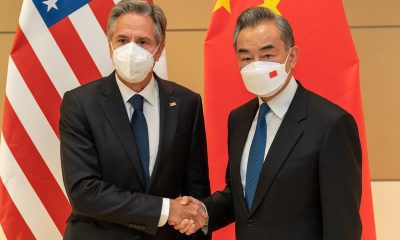Health
Weavers’ villages in India suffer TB epidemic, exacerbated by poverty and malnutrition
LOHATA, India—This cluster of poor villages, long known for its colorful silk saris, now is known for something else: tuberculosis. Nearly half of Lohata’s population has it—some 100,000 people—and the community’s weaving tradition is part of the reason it is on the front line of a major Indian health crisis.
The area of Uttar Pradesh state is under unofficial quarantine because of the epidemic. Strangers rarely venture into these villages outside the ancient city of Varanasi. Even rickshaw drivers refuse to enter, turning away the few passengers looking for a lift.
The high rate of TB cases in Lohata is unusual, even for India, where the disease kills about 300,000 people every year. Poverty and malnutrition are factors, but the fact that so many people in Lohata are weavers also is significant, said Dr. J.N. Banavalikar, vice chairman of the TB Association of India, a government agency.
Thousands of sari weavers work all day in cramped rooms, breathing in minute threads that weaken their lungs and make them more susceptible. “They work in poorly ventilated rooms for hours, and that spreads germs very fast,” Banavalikar said.
India has made important strides in health in recent years, most recently by launching a successful polio vaccination campaign. But tuberculosis has remained a stubborn problem in India, which has more than a quarter of the world’s new TB cases.
Children are especially at risk.
Mumtaz Ali says he has no way to help his 4-year-old grandson, Anwar, who coughs throughout the day, spitting blood with each spasm.
“Doctors say he is malnourished,” Ali said. “They say we should give Anwar nutritious food. But the fact is, I cannot even afford two meals a day—forget about giving him milk and eggs. Only Allah can save us.”
The average income in Lohata is about 3,000 rupees per month ($48).
In many ways, Lohata’s fortunes have fallen with the decline of the sari industry, leaving many already vulnerable families destitute.
Shruti Naghvanshi, who works with Voice of People, a conglomerate of charity groups in Uttar Pradesh, said weavers used to produce about five saris per week. Now, due to changing fashions and a lack of raw materials, weavers are lucky if they make two per week.
Less weaving means more poverty and poorer nutrition, and TB’s toll on Lohata appears to be growing. About 12,900 people in the villages died of the disease in 2011, and about 13,700 died in 2012, according to Dr. S.P. Dubey, a health official in Uttar Pradesh who oversees the TB program. Statistics for 2013 are not yet available.
India has the highest incidence of TB in the world, according to the World Health Organization’s Global Tuberculosis Report 2013, with as many as 2.4 million cases. India saw the greatest increase in multidrug-resistant TB between 2011 and 2012.
Although the government has launched programs to combat the disease and offer free TB drugs, but there are serious nationwide roadblocks. Quacks with no training often treat TB patients, and pharmacists routinely give out antibiotics without prescriptions.
“These quacks give high-potency antibiotics which initially give them relief but in the long term, these people develop drug resistance,” said Dr. Surya Kant Tripathi, head of the Department of Pulmonary Medicines at King George’s Medical University in Lucknow, the state capital.
Another factor contributing to TB’s growing drug resistance: Many patients, weary of TB drugs’ harsh side effects, stop their treatment once they feel better instead of taking the full course.
Critics say the federal government’s anti-TB campaign is inadequate. Its centerpiece is a program that pays counsellors and private groups to verify patients take their medicine, but counsellors get paid only for those who complete the standard six-month course of treatment, so they have an incentive to lie when patients drop out.
Banavalikar, of the TB association, said that in some cases local officials fail to implement federal guidelines on making drugs widely available.
“Despite reprimanding the officials, we are yet to get positive results from them,” he said. “The government is doing its best. But we do not have labs to identify TB, particularly the drug-resistant strain. So, we do not know exactly the number of TB patients and how many of them are drug-resistant.”
Uttar Pradesh Health Minister Ahmad Hasan said it’s the federal government that is failing because it is not providing enough drugs to treat everyone.
“Unless we get medicine,” he asked, “how can we control TB?”
Those suffering from the disease also say they need more help.
Farzand Ali says he borrowed 50,000 rupees ($800) from his relatives when the condition of his son, 21-year-old Ghulam, deteriorated rapidly in 2012. He took his son to a specialized TB hospital in the Indian capital, New Delhi.
“After four months’ treatment, we came back,” Ali said. “We were told my son is infected with deadly strain of multidrug-resistant TB.”
Now, Ghulam is being treated in a state-run hospital, but Ali said it is not giving him the more expensive medication he needs.
It costs 10,000 rupees ($160) per month, but Ali earns just a pittance—as a weaver.
“Where will I get this money from?” he asked.






















